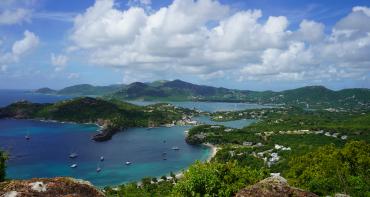The governments of Antigua and Barbuda and the United Kingdom have signed a milestone agreement, marking a key step in defining Antigua and Barbuda’s maritime jurisdiction – one of the largest in the Eastern Caribbean - and advancing the development of its blue economy.

The governments of Antigua and Barbuda and the United Kingdom have signed a milestone agreement, marking a key step in defining Antigua and Barbuda’s maritime jurisdiction – one of the largest in the Eastern Caribbean - and advancing the development of its blue economy.
The agreement, achieved with the support of the Commonwealth Secretariat, decisively sets out the boundary between Antigua and Barbuda and Anguilla, a British Overseas Territory. It was signed on 27 July by Prime Minister Gaston Browne and Resident British High Commissioner Lindsy Thompson.
The waters of Antigua and Barbuda border those of Anguilla (UK) to the northwest, Saint Barthélemy (France) to the northwest, the Federation of Saint Kitts and Nevis to the west, Montserrat (United Kingdom) to the southwest, and Guadeloupe (France) to the southeast.
With this new treaty, the island nation has successfully delimited three of its five maritime boundaries, a process that has been supported by Commonwealth technical assistance since 2014. Only the boundaries with St Kitts and Nevis and Monserrat remain to be negotiated.
Boosting the blue economy
During the signing ceremony, Prime Minister Gaston Browne highlighted the importance of the country’s Economic Exclusive Zone (EEZ), which covers approximately 107,914 km2 of ocean - almost 200 times the size of its land mass:
“These waters offer enormous potential for economic development and growth, particularly in light of the adoption of a ‘blue economy’ approach to national development.
“Today, Antigua and Barbuda takes another key step in realizing this potential. When we establish the outer limits of our maritime space, we can develop and implement methods for the utilisation of the space to its full economic potential.”
Welcoming the developments, the Commonwealth Secretary-General Patricia Scotland said: “Continuing support by the Commonwealth Secretariat towards the conclusion of Antigua and Barbuda’s maritime boundaries complements our strong commitment to blue economy principles.
“The jurisdictional certainties that such agreements provide, represents much more than a definition of the limits of national jurisdiction. They provide firm foundations for broader cooperation on preserving Antigua and Barbuda’s fragile marine biodiversity and ecosystems, and the conduct of sustainable ocean-based economic activities.”
Commonwealth support
Acknowledging the Commonwealth Secretariat’s assistance over the past several years, the chair of Antigua and Barbuda’s National Ocean Governance Committee and lead negotiator for the agreement, Ambassador Dwight C.R. Gardiner added:
“Antigua and Barbuda has been the beneficiary of tremendous support from the Commonwealth Secretariat as it seeks to delimit its maritime boundaries.
“From the inception of the project within the aegis of the National Ocean Governance Committee, the Commonwealth Secretariat has provided legal and technical support, including the provision of software and imagery to support the delimitation process.
“Without the Commonwealth Secretariat’s continuing support, Antigua and Barbuda would not have been able to achieve the delimitation of three agreed boundaries within a five-year period.”
The National Oceans Governance Committee had reached out to the Commonwealth Secretariat in 2014, leading to the development of a maritime boundary negotiation strategy, endorsed by Cabinet.
Supported by a combination of legal advice, training and technical assistance, Antigua and Barbuda commenced and concluded negotiations with France in 2016, in respect of Guadeloupe and St. Barthelemy. This momentum continued with the UK in respect of Anguilla, with the formal agreement reached after two rounds of negotiations in 2019 and 2020.
Assisting small island states
Legal adviser at the Commonwealth Secretariat, Rosemarie Cadogan, emphasised why such agreements are essential for national development:
“Although Small Island Developing States (SIDS) are entitled to vast ocean spaces which far exceed their land territory, uncertainty over the limits of their jurisdiction and lack of knowledge of the resources within these waters hampers their ability to cooperate towards conservation of cross boundary resources, prevent transboundary marine pollution and attract sustainable investment. Translating the potential of their ocean space into reality is essential.”
The Commonwealth Secretariat has delivered consistent support in concluding maritime boundary agreements and securing access to ocean resources for over three decades.
In the last five years in particular, the Ocean and Natural Resources division has provided effective support to several countries in the Caribbean, leading to four negotiated maritime boundary agreements which have entered into force; two maritime boundaries that have been agreed but not yet in force; and one other maritime boundary still in negotiation. Support has also been provided for the development of national maritime policies.
Antigua and Barbuda co-chairs the Commonwealth Blue Charter Action Group on the sustainable blue economy, alongside Kenya. The Commonwealth Blue Charter is a commitment by all Commonwealth nations to work together to tackle global ocean challenges.
Antigua and Barbuda is also partnering with the University of the West Indies and the Association of Commonwealth Universities towards establishing a new Centre of Excellence in Oceanography and the Blue Economy at the University of West Indies Five Islands Campus.
Image caption: Antigua & Barbuda’s Prime Minister Gaston Browne and Resident British High Commissioner Lindsy Thompson at the signing ceremony



